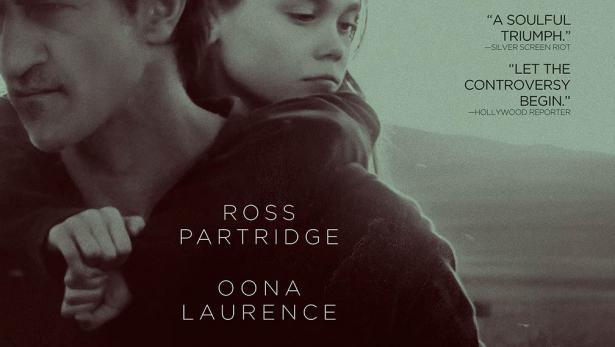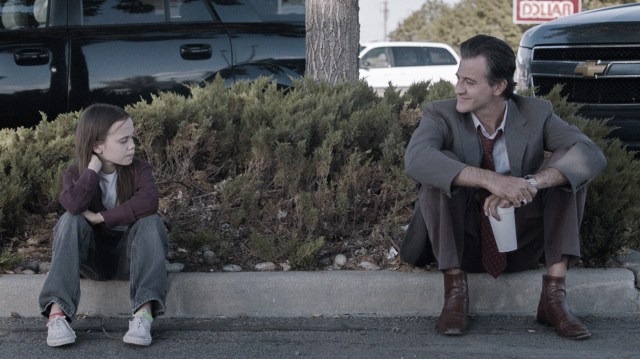The new drama Lamb tells the sad story of two lonely people: a middle-aged man in mourning named David Lamb and an 11-year-old girl named Tommie. Based on the novel by Bonnie Nadzam, the film tells the simultaneously touching and unnerving story of their relationship, after Lamb meets the child in a parking lot asking for a cigarette and realizes that like his own upbringing, she’s been neglected at home. The movie is definitely one which could prove uncomfortable for some viewers and controversial, but also a rewarding and thought-provoking film experience…and likely to ignite discussion.
While the film also features fine supporting work by actors Jess Weixler, Scoot McNairy, Jennifer Lafleur, and Joel Murry, costars Ross Patridge and Oona Laurence’s strange connection is the film’s anchor. Character actor Patridge has been a familiar face in films and movies for over two decades, and wrote and directed Lamb. 13-year-old Laurence continues her rise to stardom after being one of four actresses to originate the title role of Matilda on Broadway and appearing in last year’s I Smile Back and Southpaw. The two costars spoke about their work on this very unusual film.
Lesley Coffin (TMS): How did you initially find Oona for the role of Tommie?
Ross Partridge: We had a great casting director, who I think had worked with Oona before, named Allison Estrin. I’ve worked with her a lot myself. And I wanted to start auditioning girls right away, assuming it would be a very difficult part to cast. But Allison said it probably wouldn’t be because when you put the call out for 11 or 12 year old girls, there are relatively girls few capable of playing a role like this. And when we met with Oona that was really it.
TMS: How was the character described to you?
Oona Laurence: I remember in the script, I read it before I went to the audition that I saw her as someone who was really lonely and just wanted to fit in. But at the same time, she’s so wise and been through so much, which gave her this really sad view of the world. And that was really interesting, because I’ve never played a character like that. Someone so sad.
Partridge: It is a said thought that an 11 or 12 year old would have grown up that way.
TMS: Did you talk about the dark elements of the film and within their relationship?
Partridge: We spent about a week together in rehearsals, with her dad, talking about everything. And we didn’t shy away from anything. We just kept asking each other why and how could this happen? What happened in his life that would lead him to make these kinds of choices, and what has happened in her life that allows her to be so susceptible and eager to escape? What is she looking for from him that she’s not getting in her life at home? How neglected is she at home?
TMS: What was it like to play those scenes with her mean friends and neglectful parents?
Laurence: Well, her friends are definitely not her friends. They are fake and I think the only reason they were with her was to make fun of her. So that relationships wasn’t even important. But her parents really were neglectful and don’t treat her the way a loving parent would. They take care of her, but aren’t loving towards her. So when my character meets Lamb, it shows her someone who really cares, which was something I just want to grasp onto. It was something she’s never felt before.
TMS: When you read the novel, did you immediately think of adapting it to the screen?
Partridge: I did. Reading it I felt it would work as a film. It is very poetic and cinematic as written, and the relationship between the two of them is unlike anything I’d seen on film before. So it was intriguing to me right away?
TMS: Did the novelist give any input?
Partridge: She pretty much said, it is yours, go forth and do what you want. She read the first draft and had one question, but she pretty much gave me complete liberty. But we talk all the time and are planning on working together on another project.
TMS: Did you read the book?
Laurence: I did not. I don’t remember if you asked me not to, but I don’t think I wanted to read it before making the movie.
Partridge: Didn’t you get a French version?
Laurence: Yeah, because my mom wanted me to learn the language.
TMS: Was there a scene which felt like a turning point for the characters while filming?
Partridge: There is a scene when Tommie instigates a dance with Lamb, after he’s been instructing her throughout their journey, and that is the moment when her maturity comes through and she feels grounded enough to teach him something. And it is a brief moment when she’s trying to be joyful with him, because there isn’t that much to be joyful about in their lives.
Laurence: There were also ups and downs in their relationship, so at times I think she really wished to be back home and really miss her mom. So those ups and downs really captured my attention, but it was difficult to show that contrast on screen. But I think it developed while we were filming.
Partridge: They are both in flux, between what they need and what they want out of life don’t coincide.
TMS: There is an element later when we find out about Lamb’s traumatic childhood, and learn about his brothers. Did you look into the real world psychology of a victim of trauma repeating his past?
Partridge: Coming out of his trauma, he creates a reality which is basically what he would like to have experienced. When he meets Tommie, wearing her mother’s clothing and asking a stranger for a cigarette, he sees the alarm of where this is going to end up and it harkens back to his own upbringing. And so he wants to right the wrongs he experienced as a child for Tommie, but because this is the only life he’s ever known and was so neglected, he doesn’t have the skills. And so throughout, he stumbles and makes mistakes with Tommie.
TMS: Did you feel any stress over playing a character like Lamb, who isn’t a villain but clearly is unnerving for audiences on screen?
Partridge: I just had to come at it without judging the character. Point A to Point B, these decisions he’s making aren’t correct. But from what he’s experienced, they appear right and led him to make these choices. Just because someone’s choices don’t coincide with what the society thinks is right, we also shouldn’t allow them to simply fall through the cracks. We need to look deeper into what made him the type of human being that would have these types of ideas and think they are okay. And I think that comes up all the time, and Lamb is just another example of our own failures to look closer at people and figure out who they really are. We just have to try to imagine their experiences and have empathy for other people’s upbringings.
TMS: The third main character in the film is played by Jess Weixler, who comes in as the outsider and suddenly makes your character hide this part of his life and literally hide Oona’s character from her? What role did you need her to play in the film and how did you come to cast Jess?
Partridge: We needed a quality of innocence from Jess that Lamb and Tommie lack. She needed to be the adult who swoops into this barrage of lies and deceit, and would still be willing to listen to these stories and still want to pursue a relationship with this kind of man. She needed to susceptible but also have a strength and earnest sincerity to believe there is the possibility of something greater. She isn’t unlike Tommie, but of course, is much older. I’ve known Jess for a long time, and she has the ability to immediately endear herself to an audience. You just look at her and think “how did you get involved in this kind of situation?” But you see that all the time in relationships.
TMS: How was Ross as a director?
Laurence: I really liked the experience of working with him. He made shooting a really dark movie really fun on set. He is such an easy going director and guy, so it was really fun to hang out on set and talk about the movie and character. And he gave me freedom, but still managed to guide me towards what he wanted.
Patridge: It was a great experience.
TMS: How long was the shoot?
Patridge: 18 days with a 12 person crew.
TMS: Now that you’ve done big studio movies and little indies, do you have any thoughts on the types of movies you want to make in the future?
Patridge: The food is obviously better on those big movies.
Laurence: There is such a big difference that I wouldn’t want to choose one over the other. I honestly do like the sense of community on a movie this size. They become very tight knit when there are only 12 people. But at the same time, I really do like the food better on those bigger movies.
TMS: And I know you are working a lot as an actor, but are you working on another project to write and direct?
Patridge: I am. I’ve been so busy promoting the movie I haven’t had a chance to sit down and write much, but when this is done I will.
TMS: Are you considering writing any original stories?
Patridge: Not necessarily. I really like the process of writing adaptions. However, I am considering trying to adapt a true story, which would be a different kind of adaption.
TMS: Is Pete’s Dragon the next project you have coming out?
Laurence: That is in post-production right now. But I’m flying out to New Orleans to do a comedy called Bad Moms next.
Patridge: Your second bad mom movie for you.
Lamb is currently in select theaters and On-Demand services.
—Please make note of The Mary Sue’s general comment policy.—
Do you follow The Mary Sue on Twitter, Facebook, Tumblr, Pinterest, & Google +?










Published: Jan 17, 2016 11:00 am